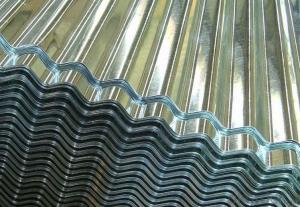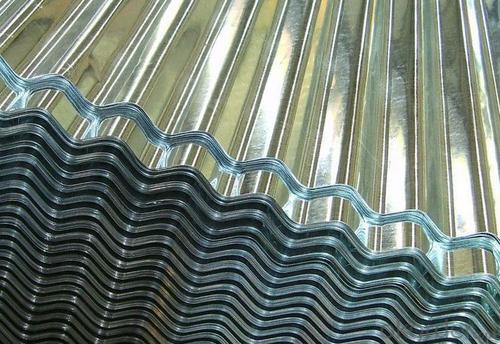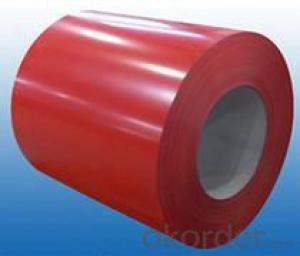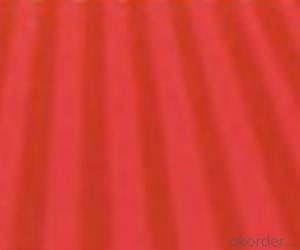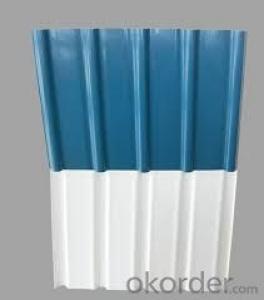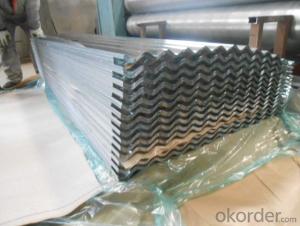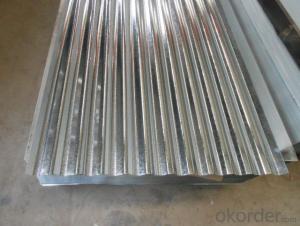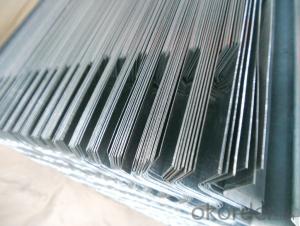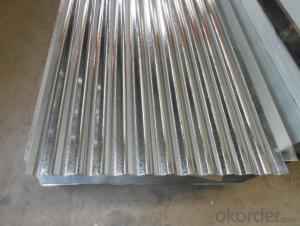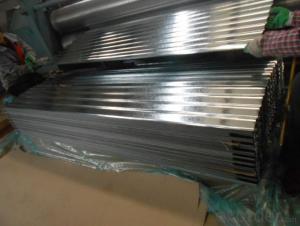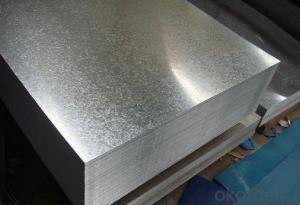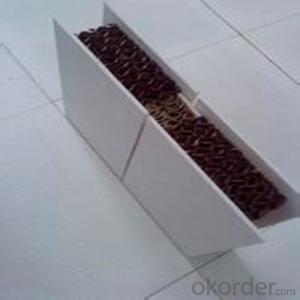Hot Dip Galvanized Corrugated Sheet for Roofing
- Loading Port:
- Tianjin
- Payment Terms:
- TT OR LC
- Min Order Qty:
- 25 m.t.
- Supply Capability:
- 50000 m.t./month
OKorder Service Pledge
OKorder Financial Service
You Might Also Like
Product Description:
Specifications of corrogate sheets :
1) Capacity: about 15,000 tons per month for sheet product.
2) Standard: JIS G3302 1998, ASTM A653M/A924M 2004, all according to the customer's request
3) Thickness: 0.13mm-0.5mm
4) Width: 400mm-1000mm
5) Length: We can adjust the length according to your request
6) Zinc Coating Weight: 60g/m2-275g/m2
7) Raw Materials: Galvanized steel sheet and Pre-painted galvanized steel sheet
8) Spangle: Regular spangle, minimized spangle and zero spangle
9) Hardness: Full hard, normal
10) Color: RAL, or other series
11) Surface Protection: PE, PVC, PVDF, SMP, HDP, etc.
12) Min trial order 10 tons each thickness, 1x20' per delivery
Specification of corrogate sheets :
1) Chemical Composition: 55% Aluminum, 43.4% Zinc, 1.6% Silicon
2) Substrate: Galvalume steel sheet & Pre-painted galvalume steel sheet
3) Standard: JIS3321/ASTM A792M.
4) Thickness: 0.16mm-2.0mm, all available
5) Width: 600mm-1250mm, all available
6) Aluminum Coating: AZ50/AZ100/AZ150/AZ185
7) Spangle: regular spangle, minimized spangle, zero spangle
8) Surface treatment: Chemical treatment, oil, dry, anti-finger print
9) Color series: RMP/SMP/HDP/PVF2
10) Min trial order: 10 ton each thickness, 1x20' per delivery
Our Production Facility of corrogate sheets :
After we get the Galvanized sheet, Galvalume sheet, or Pre-painted Sheet, our Roof Panel Forming Machine can manufacture them as Corrugated Galvalume Roofing Sheet.
- Q: How are steel sheets tested for hardness?
- Steel sheets are typically tested for hardness using a method called the Rockwell hardness test. This test involves applying a specific amount of force onto the steel sheet's surface using a diamond or hardened steel ball indenter. The depth of indentation created by the indenter is measured, which provides a hardness value on the Rockwell scale.
- Q: Do steel sheets have any magnetic properties?
- Yes, steel sheets do have magnetic properties. Steel is an alloy composed primarily of iron, carbon, and other elements, and it is known to be ferromagnetic. This means that it can be magnetized and attracts magnets. However, the degree of magnetism in steel can vary depending on its composition and processing. Some steel alloys can be easily magnetized and retain their magnetism even after the applied magnetic field is removed, while others may have lower magnetic properties. The presence of impurities and the specific heat treatment process can also affect the magnetic properties of steel. Overall, steel sheets can exhibit magnetic properties, but the degree of magnetism may vary depending on the specific type and composition of the steel.
- Q: Are steel sheets suitable for sports stadiums or arenas?
- Yes, steel sheets are suitable for sports stadiums or arenas. Steel is known for its strength and durability, making it an ideal material for supporting large structures like stadiums. It can provide the necessary structural integrity, withstand heavy loads, and resist extreme weather conditions. Additionally, steel sheets can be easily fabricated and customized to meet the specific design requirements of sports stadiums or arenas.
- Q: What is the average yield strength of steel sheets?
- The specific grade and thickness of steel being used can cause variations in the average yield strength of steel sheets. Typically, the average yield strength of steel sheets falls between 250 and 600 megapascals (MPa). It is worth noting that different steel grades, such as mild steel, high-strength low-alloy (HSLA) steel, or stainless steel, will have different average yield strengths. Furthermore, the yield strength of a steel sheet can be affected by its thickness, with thinner sheets generally having higher yield strengths. Therefore, it is crucial to refer to the manufacturer's specifications or industry guidelines to determine the specific average yield strength for a particular steel sheet.
- Q: Are the steel sheets easy to maintain?
- Yes, steel sheets are generally easy to maintain. They are durable and resistant to corrosion, which means they require minimal upkeep. Regular cleaning with mild detergent and water is usually sufficient to keep them looking clean and polished. Additionally, steel sheets do not require painting or staining, further reducing maintenance requirements. In cases where there are scratches or minor damages, they can be easily repaired or buffed out. Overall, steel sheets are a low-maintenance option for various applications.
- Q: What is the typical thickness tolerance of a steel sheet?
- Depending on the specific industry and application requirements, the thickness tolerance of a steel sheet can vary. In general, a standard steel sheet may have a thickness tolerance ranging from +/- 0.001 inches to +/- 0.010 inches. This implies that the actual thickness of the sheet can fall within these tolerances. The determination of the tolerance level is influenced by factors including the manufacturing process, the intended use of the sheet, and the desired level of precision. It is worth mentioning that certain industries or applications may necessitate more precise tolerances, particularly when dimensional accuracy is of utmost importance.
- Q: What is the process of etching designs on steel sheets?
- The process of etching designs on steel sheets involves applying a protective layer, known as a resist, on the surface of the steel. The resist is then selectively removed to expose the desired design. Next, the steel sheet is immersed in an acid solution that gradually etches away the exposed areas, creating the desired design. The depth and intricacy of the etching can be controlled by adjusting the duration of the immersion. Finally, the remaining resist is removed, leaving behind a beautifully etched design on the steel sheet.
- Q: Why should the back of the steel sheet pile cofferdam be pumped after the construction of the pile cap?
- The appearance of surface defects of steel sheet pile, length, width, thickness, end rectangle ratio, flatness and lock shape content of inspection, do not meet the requirements of steel sheet pile is corrected, in order to reduce the difficulties in piling process.
- Q: Can steel sheets be used for modular construction or prefabricated buildings?
- Yes, steel sheets can be used for modular construction or prefabricated buildings. Steel sheets offer high strength and durability, making them suitable for constructing modular or prefabricated buildings. They can be easily fabricated, assembled, and disassembled, allowing for efficient construction processes. Additionally, steel sheets provide excellent resistance to fire, pests, and extreme weather conditions, making them a popular choice for modular construction or prefabricated buildings.
- Q: Can steel sheets be used for manufacturing storage tanks?
- Yes, steel sheets can be used for manufacturing storage tanks. Steel is a durable and strong material that can withstand high pressures and is resistant to corrosion, making it suitable for storing various substances.
Send your message to us
Hot Dip Galvanized Corrugated Sheet for Roofing
- Loading Port:
- Tianjin
- Payment Terms:
- TT OR LC
- Min Order Qty:
- 25 m.t.
- Supply Capability:
- 50000 m.t./month
OKorder Service Pledge
OKorder Financial Service
Similar products
Hot products
Hot Searches
Related keywords
